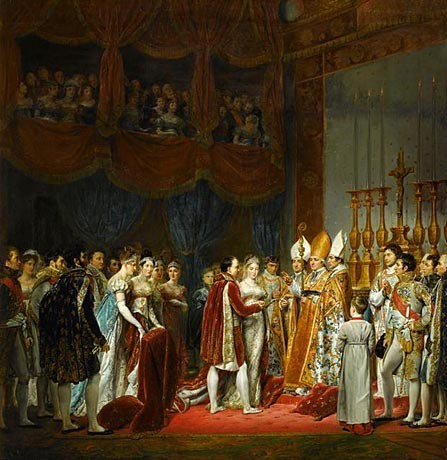After his repudiation of Josephine (November 1809), Napoleon became joined in holy wedlock to Marie-Louise, the daughter of the Emperor of Austria. Without mincing his words, he declared to his entourage: “I am marrying a womb”. The first mission of the new Empress was indeed to provide him with an heir, which she did: the Emperor’s son was born on 20 March 1811. But this Austrian marriage had another goal: to strengthen France’s preponderance on the continent, in addition to the imperial marriage, by allying the country to a prestigious and powerful monarchy … a monarchy which, at that time, was more than happy to follow suit. With this new alliance, Napoleon was turning his back on his “Russian” policy, the benefits of which were not great enough for his liking. For the next four years, France’s main alliance in Europe was to become once again – as it had been in the time of the last two Bourbon kings – one that united the dynasty in Paris with that of the Habsburg-Lorraine.
The marriage was accompanied by negotiations that led not only to the handing over of a large part of the war indemnity owed by Austria following its defeat in 1809 but also to trade agreements. And as Russia became a threat, it was agreed that the alliance would be used to expel that country from continental affairs. A Franco-Austrian system was emerging, even though, in Vienna, caution remained the watchword. Though the Austrian Emperor and his Chancellor Metternich were well aware that it was in their interest – for the moment – to be good allies of Napoleon. An Austrian corps thus participated alongside the Grande Armée during the invasion of Russia. In order to have once again an important position in Europe, Vienna needed this alliance that gave her real weight against other candidates for hegemony, such as Britain and, above all, Russia. This partly explains why Metternich tried, almost to the end, to save the Bonaparte dynasty, now linked to that of the Habsburgs. Metternich’s “change of course” was gradual and corresponded to the Napoleonic Empire’s successive mistakes and gradual weakening: his position moved imperceptibly from alliance with France, to armed mediation, and finally to a declaration of war. Not because he did not like Napoleon any more (did he ever?), but because the latter’s power became less and less useful to him. The Austrian statesman was so skilful that, with the Congress of Vienna, he succeeded in restoring to the Habsburg monarchy its former splendour and power for half a century.
As a result of the passage of time, the turn of events, and Metternich’s good use of circumstance, the marriage between Napoleon and Marie-Louise paradoxically ended up benefiting Austria.


